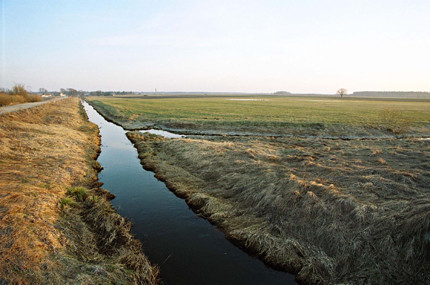Deimantas Narcevicius
20 May - 13 Aug 2006
Deimantas Narkevicius, a Lithuanian artist and film director, uses his films and his photographic work to reflect developments in a society of transition.
New photographic works and films will be shown. The photos are concerned with the “radical modernisation” of Lithuania (as Narkevicius describes it) that was characteristic of the Soviet period. Essentially the artist sees the present as having been built on these relics of the 50s and 70s, even if this past is largely ignored today. The film “Matrioskos” uses a documentary style which suggests to portray the lives of four Lithuanian prostitutes. The human and social tragedy has a touching effect on the viewer, allowing the evident discrepancy between image and narrative to be bridged over. These authentic life reports give way to calculated scene-setting: the prostitutes, after all, turn out to be actresses. The film is an re-enactment of the existing TV series "Matroesjka's (produced by VTM, Belgium).
“The Role of a Lifetime” is likewise dedicated – explicitly this time – to the credibility of the rendering of reality. The protagonist is the film director Peter Watkins, who expounds upon the problems of creating reality in film. He reports on his endeavours „to interrogate the form that we call reality, showing that in fact it is highly individual and subjective.” At the same time the camera travels slowly over drawings of snow-covered Lithuanian landscapes and socialist sculptures. A local businessman had collected statues of Lenin, Marx and other prominent socialists and had them set up in Grutko Park – the park which is to be shown in Narkevicius’ film. The decision to show the socialist monuments not directly but indirectly – in the drawings of Mindaugas Lukosaitis – creates a distance and a certain mode of reflection that would otherwise be impossible. In both films Narkevicius lays bare the methods by which his own film has been produced, and just like Watkins, he is well aware that there is no such thing as a neutral position, either for the film director or for the audience – that we are inevitably led by our feelings, preferences, expectations and ideologies. Deimantas Narkevicius challenges people to consider the ways in which reality is constructed and projected, and to engage with this process in an active way. Constructions of history are at disposal: the history of Lithuania, its Soviet past, modern promises of social change. Reality is not just accepted as something monolithic and unchangeable, but rather produced in a performative and spontaneous act of engagement. The relationship of the subject to reality is essentially governed by projection and interpretation. Thus reality never appears to us directly – but always as an image/projection to be interpreted.
New photographic works and films will be shown. The photos are concerned with the “radical modernisation” of Lithuania (as Narkevicius describes it) that was characteristic of the Soviet period. Essentially the artist sees the present as having been built on these relics of the 50s and 70s, even if this past is largely ignored today. The film “Matrioskos” uses a documentary style which suggests to portray the lives of four Lithuanian prostitutes. The human and social tragedy has a touching effect on the viewer, allowing the evident discrepancy between image and narrative to be bridged over. These authentic life reports give way to calculated scene-setting: the prostitutes, after all, turn out to be actresses. The film is an re-enactment of the existing TV series "Matroesjka's (produced by VTM, Belgium).
“The Role of a Lifetime” is likewise dedicated – explicitly this time – to the credibility of the rendering of reality. The protagonist is the film director Peter Watkins, who expounds upon the problems of creating reality in film. He reports on his endeavours „to interrogate the form that we call reality, showing that in fact it is highly individual and subjective.” At the same time the camera travels slowly over drawings of snow-covered Lithuanian landscapes and socialist sculptures. A local businessman had collected statues of Lenin, Marx and other prominent socialists and had them set up in Grutko Park – the park which is to be shown in Narkevicius’ film. The decision to show the socialist monuments not directly but indirectly – in the drawings of Mindaugas Lukosaitis – creates a distance and a certain mode of reflection that would otherwise be impossible. In both films Narkevicius lays bare the methods by which his own film has been produced, and just like Watkins, he is well aware that there is no such thing as a neutral position, either for the film director or for the audience – that we are inevitably led by our feelings, preferences, expectations and ideologies. Deimantas Narkevicius challenges people to consider the ways in which reality is constructed and projected, and to engage with this process in an active way. Constructions of history are at disposal: the history of Lithuania, its Soviet past, modern promises of social change. Reality is not just accepted as something monolithic and unchangeable, but rather produced in a performative and spontaneous act of engagement. The relationship of the subject to reality is essentially governed by projection and interpretation. Thus reality never appears to us directly – but always as an image/projection to be interpreted.

